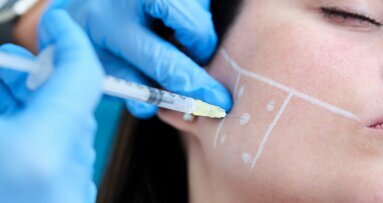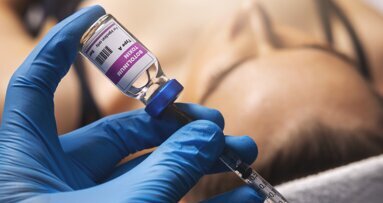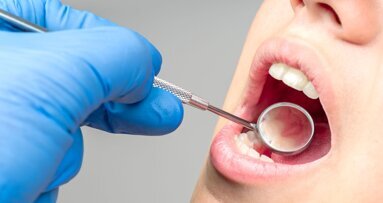HOUSTON, U.S.: A new pilot study has suggested that botulinum toxin might be a feasible way to treat people suffering from bruxism. In the double-blind placebo study, researchers tested the safety and efficacy of onabotulinum toxin-A (BoNT-A) injected into the masseter and temporal muscles in patients with symptomatic sleep bruxism. According to the results, those who received the injection reported minimized tooth grinding and clenching.
The study involved 22 patients between 18 and 85 years old with clinically diagnosed sleep bruxism, confirmed by polysomnography. The researchers, from the Houston Methodist Neurological Institute, injected 13 participants with 200 BoNT-A units (60 into each masseter and 40 into each temporal muscle) and the remaining patients with the placebo.
Speaking to Dental Tribune International, head researcher Dr. Willian Ondo said, “There are many different theories regarding the genesis of bruxism, ranging from purely psychiatric to purely mechanical. Nevertheless, all movement is mediated by muscles, therefore relaxing the appropriate muscles that cause jaw grinding with botulinum toxin should reduce those movements, regardless of the condition’s etiology.”
According to the results, after the four- and eight-week checkups, participants who were given the placebo injection recorded no improvement to their bruxism condition. However, those who were injected with BoNT-A reported a positive effect with less general grinding and clenching, as well as a reduction in general, associated pain.
According to the researchers, this points to BoNT-A being an effective and safe way to improve sleep bruxism; however, they recommended a large multicenter trial to confirm the initial findings. “There have been a couple of small studies on using botulinum toxin for bruxism done in Asia. We would like to perform a large multicenter trial in North America, but currently there are no active plans to do this,” said Ondo.
The study, titled “Onabotulinum toxin-A injections for sleep bruxism: A double-blind, placebo-controlled study,” was published in the Neurology journal on Jan 17 2018.
Tags:
HOUSTON, U.S.: A new pilot study has suggested that botulinum toxin might be a feasible way to treat people suffering from bruxism. In the double-blind ...
Hypertrophy of the masseter muscle is defined as the excessive growth of muscle mass in the transverse direction and is more common between the second and ...
BANGKOK, Thailand: Given the growing demand for non-surgical facial contouring and ongoing debate about the functional effects of muscle-relaxing procedures...
WARDHA, India: The use of botulinum toxin (BT), commonly referred to as Botox, is gaining traction in the dental field, offering both therapeutic and ...
YORK, UK: Fear of the dentist is something some people suffer from more than others. With multiple reasons for dental anxiety and its effects, there is ...
ITABIRA, Brazil: Verbal bullying at school can negatively impact an adolescent’s mental health, causing distress and anxiety. A Brazilian study has shown ...
PHILADELPHIA, US: Periodontitis is one of the world’s most prevalent health conditions, affecting between 20% and 50% of the global population—roughly ...
LONDON, UK: Though the relative benefits of chewing gum are often subject to debate, a number of studies have shown that the sugar-free varieties can ...
NEW YORK, US: Oral tumours can cause agonising pain and thus greatly impair the quality of life of patients. Researchers from the New York University ...
More than 11 million people in the United Kingdom, have reported food insecurity over a 12 month period according to The Trussel Trust. Dental clinicians ...
Live webinar
Tue. 24 February 2026
1:00 pm EST (New York)
Prof. Dr. Markus B. Hürzeler
Live webinar
Tue. 24 February 2026
3:00 pm EST (New York)
Prof. Dr. Marcel A. Wainwright DDS, PhD
Live webinar
Wed. 25 February 2026
11:00 am EST (New York)
Prof. Dr. Daniel Edelhoff
Live webinar
Wed. 25 February 2026
1:00 pm EST (New York)
Live webinar
Wed. 25 February 2026
8:00 pm EST (New York)
Live webinar
Tue. 3 March 2026
11:00 am EST (New York)
Dr. Omar Lugo Cirujano Maxilofacial
Live webinar
Tue. 3 March 2026
8:00 pm EST (New York)
Dr. Vasiliki Maseli DDS, MS, EdM



 Austria / Österreich
Austria / Österreich
 Bosnia and Herzegovina / Босна и Херцеговина
Bosnia and Herzegovina / Босна и Херцеговина
 Bulgaria / България
Bulgaria / България
 Croatia / Hrvatska
Croatia / Hrvatska
 Czech Republic & Slovakia / Česká republika & Slovensko
Czech Republic & Slovakia / Česká republika & Slovensko
 France / France
France / France
 Germany / Deutschland
Germany / Deutschland
 Greece / ΕΛΛΑΔΑ
Greece / ΕΛΛΑΔΑ
 Hungary / Hungary
Hungary / Hungary
 Italy / Italia
Italy / Italia
 Netherlands / Nederland
Netherlands / Nederland
 Nordic / Nordic
Nordic / Nordic
 Poland / Polska
Poland / Polska
 Portugal / Portugal
Portugal / Portugal
 Romania & Moldova / România & Moldova
Romania & Moldova / România & Moldova
 Slovenia / Slovenija
Slovenia / Slovenija
 Serbia & Montenegro / Србија и Црна Гора
Serbia & Montenegro / Србија и Црна Гора
 Spain / España
Spain / España
 Switzerland / Schweiz
Switzerland / Schweiz
 Turkey / Türkiye
Turkey / Türkiye
 UK & Ireland / UK & Ireland
UK & Ireland / UK & Ireland
 Brazil / Brasil
Brazil / Brasil
 Canada / Canada
Canada / Canada
 Latin America / Latinoamérica
Latin America / Latinoamérica
 USA / USA
USA / USA
 China / 中国
China / 中国
 India / भारत गणराज्य
India / भारत गणराज्य
 Pakistan / Pākistān
Pakistan / Pākistān
 Vietnam / Việt Nam
Vietnam / Việt Nam
 ASEAN / ASEAN
ASEAN / ASEAN
 Israel / מְדִינַת יִשְׂרָאֵל
Israel / מְדִינַת יִשְׂרָאֵל
 Algeria, Morocco & Tunisia / الجزائر والمغرب وتونس
Algeria, Morocco & Tunisia / الجزائر والمغرب وتونس
 Middle East / Middle East
Middle East / Middle East












































To post a reply please login or register